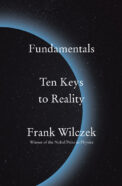Fundamentals
Frank Wilczek
Penguin Push, $26
As the story is ordinarily advised, science started when some deep thinkers in historical Greece made the decision to reject the popular mythological explanations for various organic phenomena. Individuals early philosophers sought reasonable explanations for points like thunderstorms, alternatively than attributing them to Zeus throwing mood tantrums in the variety of thunderbolts.
But early Greek scientific philosophy was not simply about changing myth with logic. For the Greeks, outlining fact did not indicate just devising a logical rationale for every single normal phenomenon in isolation — it was also about trying to get a deep, coherent clarification for anything. And that meant figuring out essential concepts that stated a variety of phenomena, encompassing the totality of physical reality. Which is the essence of science.
Science today is vastly much more superior, precise and sophisticated than it was in historic periods. However, all of today’s subtle knowledge of physical fact is also rooted in a couple essential ideas, which physics Nobel laureate Frank Wilczek tries to recognize and demonstrate in his latest e book, Fundamentals: 10 Keys to Reality.
Wilczek’s fundamentals are framed as the “fundamental lessons we can find out from the research of the physical environment,” as expressed by “the central messages of modern physics.” Each chapter assesses a single of the “broad principles” he regards as basic. He describes their role in modern day physical comprehending and relates them to “how we humans in good shape into the major picture.”
He divides his account into two principal components: “What there is” and “Beginnings and ends.” He describes the fundamentals he identifies from the perspective of two themes: “abundance” and “born again.” (He does not signify “born again” in a spiritual sense, but fairly as an expression of the need to have to notice that the watch of the globe based mostly on standard human knowledge does not conform to the fundamental actuality that modern-day science reveals. As adults, we should be “born once more,” without having preconceptions formed in childhood, to enjoy the true fundamentals of actuality.)
What there is, Wilczek avers, involves plenty of room and a good deal of time. Room, for occasion, is wide no subject which way we appear — when compared with the universe, people today are very small as opposed with the atom, people today are massive. Likewise, the universe has existed for a pretty long time and has an even for a longer time future ahead of it. Additional components of this large cosmos ultimately consist of a handful of subatomic particles, or much more precisely, quantum fields dependable for all those particles. And their conduct is ruled by a modest set of bodily legal guidelines, as codified in the equations of general relativity and physicists’ “standard model” of particles and forces. Those components, although constrained in variety, exist in considerable portions. And the supply of electrical power in the cosmos needed to cook dinner all those substances into complex issues is enormous: A single star (the sun) emits hundreds of moments additional than the overall annual electricity usage of the Earth’s entire population.
Wilczek describes how all people substances arrived to be in the form we see these days in his “Beginnings and ends” chapters. A key part of the tale is the emergence of complexity irrespective of the simplicity of the fundamentals — the incredibly several ingredients ruled by really couple rules. It turns out that small variations in the distribution of the ingredients lead to a range of structure and composition discovered on all scales in the course of the cosmos. Fuel clouds in house that vary only a bit, for example, “can generate programs of stars and planets that vary dramatically.”
One more critical idea is Wilczek’s final basic, the physicist Niels Bohr’s basic principle of complementarity. Knowledge the world demands the head-expanding realization that a person point viewed “from various views, can seem to be to have quite diverse or even contradictory qualities.” And that is why “the earth is basic and complex, reasonable and strange, lawful and chaotic.”
Fundamentals is an participating account of the heritage of humankind’s knowledge of reality, advised by just one of the essential contributors to recent pieces of that story. Wilczek’s grasp on the physics he relates is detailed and authoritative he conveys technicalities with a scarce combination of accuracy and accessibility. He is a minor sketchy on some of his record, while. He offers an incorrect date for the Geiger-Marsden experiment primary to the discovery of the atomic nucleus, for example. Also, Einstein did not base his original proposal of photons on Max Planck’s do the job, and Wolfgang Pauli did not say the neutrino could not be observed in the letter wherein he originally proposed it.
These quibbles apart, Wilczek gives an extremely clear information to the point out of actual physical information in the early 21st century, much in the spirit of the kind of explanation that the historical Greeks wished-for. Of training course, as Wilczek emphasizes, the story is not almost more than. Probably a century or much more from now, a person else will have to acquire up the endeavor all over again.
“We do understand several aspects of the bodily environment incredibly deeply,” Wilczek writes. Nonetheless “our understanding of the actual physical planet is continue to growing and altering. It is a residing point.”
Purchase Fundamentals from Amazon.com. Science News is a participant in the Amazon Companies LLC Associates Program. Be sure to see our FAQ for additional information.


